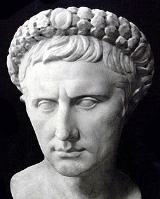
, which he ruled alone from 27 BC until his death in 14 AD.The dates of his rule are contemporary dates; Augustus lived under two calendars, the Roman Republican until 45 BC
, and the Julian after 45 BC. Due to departures from Julius Caesar's intentions, Augustus restored the Julian calendar in 8 BC, and the correspondence between the proleptic Julian calendar
and the actual calendar observed in Rome is uncertain before 8 BC.(Blackburn & Holford-Strevens 2003: 670–1) Born Gaius Octavius Thurinus, he was adopted
posthumously by his great-uncle Gaius Julius Caesar
in 44 BC via his last will and testament, and between then and 27 BC was officially named Gaius Julius Caesar.
If we could survive without a wife, citizens of Rome, all of us would do without that nuisance; but since nature has so decreed that we cannot manage comfortably with them, nor live in any way without them, we must plan for our lasting preservation rather than for our temporary pleasure.![]()
If I have played my part well, clap your hands, and dismiss me with applause from the stage.![]()
At the age of nineteen, on my own initiative and at my own expense, I raised an army by means of which I restored liberty to the republic, which had been oppressed by the tyranny of a faction. For which service the senate, with complimentary resolutions, enrolled me in its order...![]()
Those who slew my father I drove into exile, punishing their deed by due process of law, and afterwards when they waged war upon the republic I twice defeated them in battle.
![]()
Wars, both civil and foreign, I undertook throughout the world, on sea and land, and when victorious I spared all citizens who sued for pardon. The foreign nations which could with safety be pardoned I preferred to save rather than to destroy.
![]()
I declined to be made Pontifex Maximus|Pontifex Maximus in succession to a colleague still living, when the people tendered me that priesthood which my father had held. Several years later I accepted that sacred office when he at last was dead who, taking advantage of a time of civil disturbance, had seized it for himself, such a multitude from all Italy assembling for my election, in the consulship of Publius Sulpicius and Gaius Valgius, as is never recorded to have been in Rome before.
![]()

